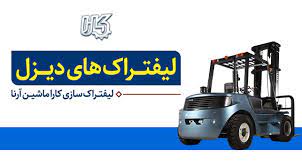Why Is the Purchase Price of a Forklift Important?
Forklifts play a crucial role in the material handling and logistics industry. These powerful industrial vehicles are essential for efficiently moving heavy loads, reducing labor costs, and ensuring overall workplace productivity. When considering acquiring a forklift for your business, the purchase price is a critical factor that demands careful consideration. While the temptation to opt for the cheapest option may be strong, it is essential to recognize that قیمت خرید لیفتراک is not the sole determinant of its true value. This article explores the significance of the purchase price of a forklift and why it should be evaluated alongside other important factors.
Initial Investment
The most obvious reason why the purchase price of a forklift is crucial is the initial investment required. Businesses, particularly small and medium-sized enterprises, need to be prudent in managing their budgets. A higher purchase price may strain financial resources, affecting other aspects of the business’s operations. Therefore, businesses should strike a balance between their budget constraints and the quality and capabilities of the forklift they are considering to purchase.
Total Cost of Ownership (TCO)
قیمت خرید لیفتراک is just the tip of the iceberg. It is essential to consider the Total Cost of Ownership (TCO) over the lifespan of the forklift. TCO includes maintenance, repairs, fuel or power source, operator training, insurance, and depreciation costs. Often, a higher upfront cost may be offset by lower TCO due to increased reliability, reduced maintenance needs, and better fuel efficiency of higher-quality forklifts. Assessing the TCO helps businesses make informed decisions, ensuring long-term cost-effectiveness and maximizing their return on investment.
Productivity and Efficiency
The productivity and efficiency of a forklift significantly impact a business’s operations. Cheaper forklifts might lack advanced features, ergonomic designs, or modern technologies that enhance productivity and operator comfort. Investing in a higher-priced forklift with productivity-enhancing features can lead to increased throughput, reduced downtime, and improved overall efficiency. Additionally, some advanced forklift models come with telematics systems that provide valuable data on equipment utilization, allowing businesses to optimize their material handling processes.
Safety and Compliance
Safety should always be a top priority in any workplace, and forklift operations are no exception. Lower-priced forklifts may not meet the latest safety standards or lack essential safety features, increasing the risk of accidents and injuries. On the other hand, reputable manufacturers invest in research and development to ensure their forklifts adhere to stringent safety regulations. By choosing a reliable forklift with enhanced safety features, businesses can mitigate potential risks and maintain compliance with industry standards.
Reliability and Durability
The reliability and durability of a forklift are closely tied to its purchase price. While cheaper forklifts might seem attractive at first, they may be built with inferior materials and components, leading to frequent breakdowns and higher repair costs. On the other hand, investing in a well-built, higher-priced forklift can offer greater longevity and a lower likelihood of unexpected downtime. This reliability ensures consistent operations and minimizes disruptions in the supply chain.
Adaptability and Customization
The needs of each business are unique, and so are their material handling requirements. Higher-priced forklifts often come with more customization options, enabling businesses to tailor the equipment to suit their specific needs. Whether it’s specialized attachments, weight capacities, or height restrictions, investing in a versatile forklift can enhance its adaptability to a variety of tasks and contribute to the smooth functioning of operations.
Conclusion
While the purchase price of a forklift is undeniably an essential factor in the decision-making process, it should not be the sole consideration. The true value of a forklift lies in its overall cost-effectiveness, productivity, safety features, reliability, and adaptability. Businesses should conduct a thorough analysis, considering the Total Cost of Ownership, safety compliance, and long-term benefits of higher-priced forklifts. By prioritizing these factors, businesses can make an informed decision that aligns with their needs and leads to better efficiency, productivity, and success in their material handling operations.







